An insightful martial arts class shed light on what would become Gavin Troyer’s budding career in the electric cooperative industry.
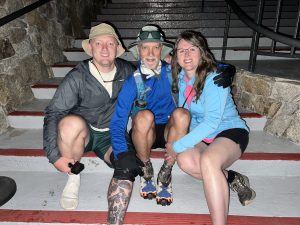
Gavin Troyer, left, with his parents, Randy and Melissa Troyer. Gavin knew about the electric cooperative industry thanks to his parents’ jobs at LaGrange County REMC. LaGrange is one of WVPA’s 21 member electric distribution cooperatives.
Then again, he already knew more than most about the industry thanks to his parents’ jobs at LaGrange County REMC. Yet when it came time to consider career possibilities, he gained insights from his Brazilian jiu-jitsu instructor, who gave him direction (literally) about Wabash Valley Power Alliance, where he has grown his career. Learn more about how Gavin started his career after college at WVPA, and how his journey has evolved.
Can you share what first sparked your interest in the energy/co-op industry?
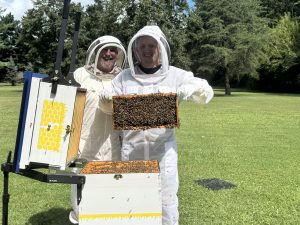
Gavin Troyer, right, holding bees while standing with Steve Luckey, his father-in-law and Hendricks Power Cooperative employee. One of Gavin’s interest includes owning a beehive.
Though I did not know it then, it all started when I was about 10 years old, and my dad got a job at LaGrange County REMC. That was my first exposure to electric cooperatives, though I didn’t really understand what LaGrange REMC did or what my dad’s role was.
As I got into high school, I thought I wanted to go into civil engineering and build bridges, though after my first introductions to statics I learned that was not for me.
As I started college at IUPUI (Go Jaguars!) I thought I wanted to go into Computer Engineering. At the time, I thought electricity was boring and probably already figured out. That lasted until my first programming class, when I quickly realized that “boring old electricity” might be more interesting to me than coding!
Working at Wabash is your first job post-graduation. What made you choose to join our company?
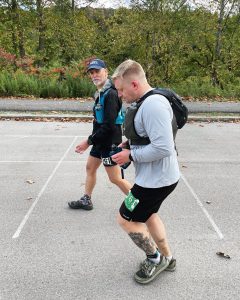
Gavin Troyer running a race. Gavin enjoys running a variety of kinds of races, including ultramarathons.
After switching to Electrical Engineering, I pretty much knew right away that I wanted to work in the utility industry. When I graduated, I only applied to utility companies or power-related organizations.
Even though my dad worked at one of the co-ops, I didn’t know where WVPA was located, or even what it really was. Funny enough, it was my Brazilian jiu-jitsu coach who told me to check out Wabash Valley Power. I told him I wasn’t interested in moving to Wabash, and he laughed and said, “They’re in Indy!”
I looked them up, and luckily for me, WVPA had an opening for an entry-level Substation Engineering position, which was basically my dream job at the time.
How has your role evolved since you first started at Wabash?
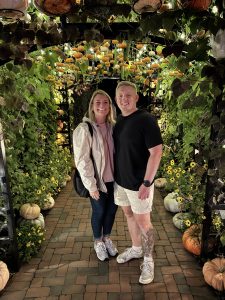
Gavin Troyer and his wife, Kendra.
Since starting at WVPA, it’s been a constant evolution. Honestly, it’s been both incredibly fun and challenging. I began as a Substation Engineer, and what started as supporting a few projects quickly escalated into managing them after several team members left.
I wouldn’t say I was a great project manager (or even a good one), but I definitely learned a lot.
Trial by fire isn’t the most comfortable way to grow, but I haven’t found a better teacher yet.
A few years ago, I had the chance to interview for a newly created supervisor position. At first, I was hesitant, I remember thinking, “If only they had waited a couple more years to post this.” But after talking with several coworkers, I decided to go for it. I was fortunate enough to be selected to lead the Power System Design team, once again, landing in my dream job.
What advice would you give to students or young professionals considering a career in the energy/co-op world?
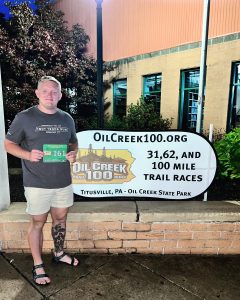
Gavin Troyer posing at the Oil Creek 100 trail race in Pennsylvania.
First, I would say go for it! This is an awesome industry and we are going to need great people to join us. The piece of advice I would share is something I always tell our engineering interns: don’t think of yourself as just an “electrical,” “mechanical,” or “civil” engineer. Forget the labels, be an engineer. That means learning about other disciplines and being curious beyond your specialty. This applies to everybody, not just engineers. In the industry, we all have our areas of expertise, but to truly contribute and drive change, you need to understand the bigger picture. You have to be able to intelligently discuss and collaborate on work outside your domain. Without that broader perspective, it’s hard to make meaningful impact.
What do you think makes this industry such a rewarding place to work?
It’s the people and it’s the mission. Cooperative people are my kind of people. I love the shared mission we’re all working toward, the problem-solving, and the fact that we can drive meaningful change right from where we are, regardless of our title. Just as importantly, I love the story of the cooperatives. Nobody wanted to bring power lines to the rural communities so the cooperatives formed to do just that.
What’s one surprising fact about your job that most people might not know?
I don’t think my role is all that surprising, though the breadth of responsibilities might be. I supervise our Transmission Line Engineering, Substation Engineering, Protection & Control Engineering, and Drafting teams. While there are some overlaps, each group is highly specialized. Luckily for me the people that make up those teams are great at their jobs so mostly I try to stay out of their way.
It’s definitely a challenge to stay on top of everything happening across the teams and to continuously look for ways to improve. But I’ve been incredibly fortunate to receive a lot of grace and support from the team as I’ve learned (and continue to learn) how to lead more effectively.
Outside of work, what are some of your favorite things to do or hobbies you enjoy?
This changes by the day; I tend to dive into different interests for a while and then pivot to something new. For a time, it was Brazilian jiu-jitsu, then lifting and running. These days, I’ve got a pretty sizable garden, a beehive, and chickens are probably not far off.
One of the most rewarding hobbies I’ve found is running, specifically ultrarunning. In 2023, I completed a 100K race called the Oil Creek 100. That’s 62 miles, and it took me 19 hours and 42 minutes (which is pretty slow).
It’s cliché to say, but ultrarunning really is a lot like life. One thing I always tell people who are getting into it is:
“The good times don’t last, so enjoy them. The bad times don’t last, so don’t give up.” I think that applies to everyday life too. Sometimes things are great, sometimes they’re tough, but whatever it is right now, it’s going to change. So, acknowledge it, appreciate it, and keep taking one step at a time.
Outside of all that, I mostly (sometimes) do whatever my wife Kendra tells me to do, though not nearly as quickly as she would like.

